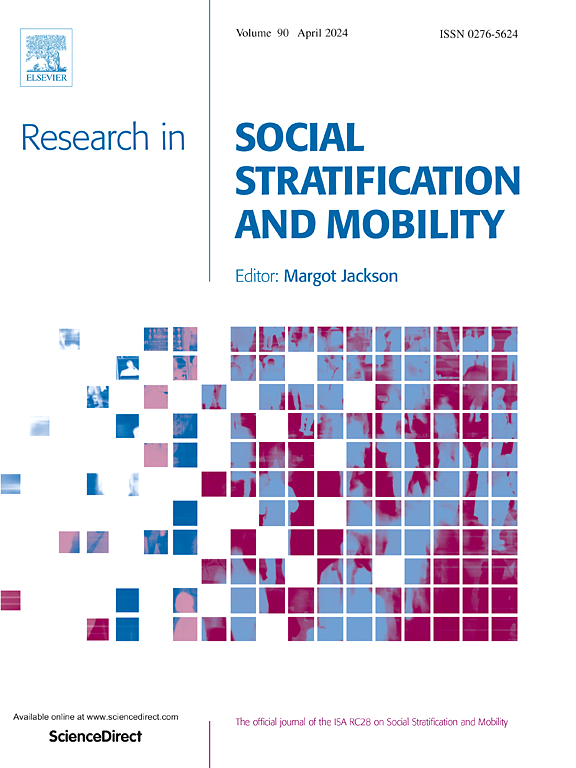Educational sorting in unions and subjective well-being in Europe: Gender differences and contextual variations
IF 2
1区 社会学
Q1 SOCIOLOGY
引用次数: 0
Abstract
This study examines the associations between educational sorting—the intra-couple difference in education—and subjective well-being of heterosexual partners in Europe, independent of each partner’s education status. It extends the literature by exploring whether and how these associations vary across societies and normative climates. A sample of 180,733 respondents in marriage or cohabitation from 29 countries was selected from Rounds 1–10 (2002–2020) of the European Social Survey and analyzed using the Diagonal Mobility Models. Pooled analyses show that net of status effects, hypergamy (women partnering with more educated men) was associated with lower well-being for both genders, and men were more satisfied with life in hypogamous relationships (partnering with more educated women). These patterns varied across societies, illustrated, for instance, by a hypergamy advantage among men in Southern Europe and women in the Baltic states. Notably, women’s well-being disadvantage in hypergamy was exacerbated in contexts where such partnerships were less normative. These findings provide unique insights into the diverse well-being outcomes of assortative mating between genders and across societies, shaped, in part, by societal norms.
欧洲工会的教育分类与主观幸福感:性别差异和语境差异
本研究考察了欧洲异性恋伴侣的教育分类(夫妻之间的教育差异)与主观幸福感之间的关系,而不受每个伴侣的教育状况的影响。它通过探索这些关联是否以及如何在社会和规范气候中变化来扩展文献。从欧洲社会调查的第1-10轮(2002-2020)中选择了来自29个国家的180733名已婚或同居的受访者,并使用对角线流动性模型进行了分析。综合分析表明,在地位效应的影响下,一夫多妻制(女性与受教育程度更高的男性合作)与两性的幸福感都较低有关,而男性对低配偶关系(与受教育程度更高的女性合作)的生活更满意。这些模式在不同的社会中有所不同,例如,南欧男性和波罗的海国家女性的一夫多妻制优势就说明了这一点。值得注意的是,在这种伙伴关系不太规范的情况下,妇女在一夫多妻制中的福利劣势会加剧。这些发现为性别之间和社会之间的分类交配的不同福祉结果提供了独特的见解,部分受社会规范的影响。
本文章由计算机程序翻译,如有差异,请以英文原文为准。
求助全文
约1分钟内获得全文
求助全文
来源期刊
CiteScore
7.80
自引率
6.00%
发文量
46
期刊介绍:
The study of social inequality is and has been one of the central preoccupations of social scientists. Research in Social Stratification and Mobility is dedicated to publishing the highest, most innovative research on issues of social inequality from a broad diversity of theoretical and methodological perspectives. The journal is also dedicated to cutting edge summaries of prior research and fruitful exchanges that will stimulate future research on issues of social inequality. The study of social inequality is and has been one of the central preoccupations of social scientists.

 求助内容:
求助内容: 应助结果提醒方式:
应助结果提醒方式:


